Mountain police of the first half of the 19th century
So, Lieutenant General Fyodor Filippovich Roth (during his tenure as commandant of the Anapa Fortress in the 1840 year — colonel) was also the initiator of the creation of mountain police detachments. Commandant Roth was famous as a “kind, attentive, honest and fair” commander (as military engineer Mikhail Fedorovich Fedorov points out in his notes), so he actively inclined the Caucasus towards a peace-loving and allied peace. He achieved such successes in his role that the mountaineers soon began to turn to him to resolve disputed land and trade disputes. It was this active officer who initiated the creation of a special squadron of loyal Shapsugs and Natukhais.
It is quite reasonable, given that the internal feuds among the Shapsugs pushed a significant part of them towards Russia, and the Natuhays, whom the anti-Russian Circassians tried to evict from the Kuban fields to the mountains, so that they did not communicate with the Russians, also more willingly converged with the Cossacks and Russian officers. In addition, it is known for certain that Colonel Roth, during the defense of Anapa from attacks, made many campaigns against the enemy Circassian tribes, in which he widely used the help of the mountain allies. As a result, in the 1841 year, an equestrian convoy of ten faithful Natukhais appeared at the disposal of Rota, and the next year the Anapa mountain half-squadron was organized. However, attempts to create such units in Anapa date back to the year 1810 under General Alexander Yakovlevich Rudzevich.
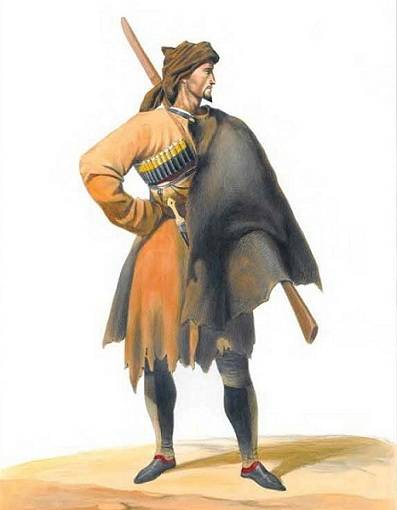
Mountain police from all over the Caucasus
But back to the beginning of the 19 century. There was a critical lack of military forces in the Caucasus of Russia. And the Patriotic War that began in the 1812 year even forced the empire to leave part of the fortifications. For example, the fort garrison was removed in the Sudzhuk (Tsemess, Novorossiysk) bay, left there by the expedition of the famous Arman-Emmanuel du Plessis Richelieu just a year before the start of the war. And five years before these events, in the 1807 year in the entire Shirvan Khanate (Northern Azerbaijan, the Caspian coast), which came under the protectorate of Russia under an agreement between General Pavel Dmitrievich Tsitsianov and Mustafa Khan in the 1805 year, there were only 15 lower ranks under one non-commissioned officer. By the way, that is why there formed a mountain police unit numbering about two hundred fighters, both foot and horse.
But Russia didn’t even think of leaving the Caucasus, therefore, even more often they found at least some way out in the formation of mountain police units. At the same time, the number of these units increased during the wars with Persia and Porta. Contrary to the prevailing prejudice that the mountaineers had completely opposed Russia, the situation was somewhat different. While the Caucasian nobility darted between the throne of the sovereign emperor, the Ottoman sultan and the Persian shah in search of ranks, lands and status, the common people remembered the devastating invasions of the Persians and Turks.
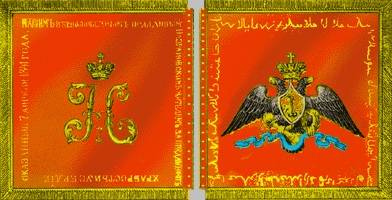
In the first half of the 19 century, mountain police detachments were created, bearing names both by ethnicity and by area of residence and the names of the commanders who formed or headed them: Nazran, Armenian, Highland, Gurian, Kurin, Ossetian, Samur, Syurga, Tagura , Shamkhal, Chechen, Akhalkalaki, Akhaltsy, Mountain Caucasus, Imereti, Mingrelian, Avar, Akushinskaya, Georgian, Dagestan, Dzharo-Lezghin, Ingush, Kazikumukh, Karabulak, Kartalin, Kurtashinsk, Mehtul nskaya, Shirvan, Shekinskaya, Kangarli, Karabakh, Albanian, Cuban, kyurinskaya, Erivan, Tatar, police Loris-Melikov, Machabeli Prince, Prince Nakashidze and so on.
Gangs of thugs and brave warriors?
Naturally, the combat activity of these formations could not be ambiguous. The composition of the irregular units themselves is too variegated. So, General Mikhail Tarielovich Loris-Melikov (in the 1854 year during the Crimean War he was still a colonel) organized a team of "hunters" from the inhabitants of the Caucasus, which became a typical detachment of mountain police. The police of Loris-Melikov consisted of three hundred Armenians, Georgians, Kurds, Greeks, Karapakhs (an ethnographic group of Azerbaijanis), residents of Muslim provinces and even runaway abreks. At the end of May 1855, the colonel’s police arrived in Alexandropol (now Gyumri) to take part in the battles against the Turks that raged in the region as part of the Crimean War.
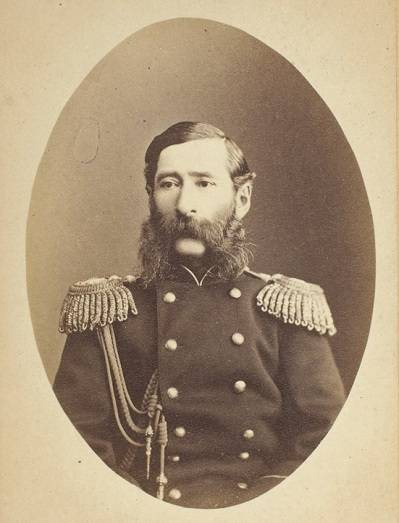
The police of Loris-Melikov, in fact, stayed in one detachment only by the will and authority of its commander, who also knew several Caucasian languages. Despite the fact that contemporaries noted courage, dexterity and excellent knowledge of the terrain by the police soldiers of Mikhail Tarielovich, the discipline level of the unit was unusually low. The reputation of this police hardly differed from the reputation of any organized crime group. Outside of hostilities, the detachment was torn by conflicts on domestic, ethnic and religious grounds, which often ended in stabbing and, consequently, the death of one of the soldiers. In addition, the irregular nature of the police responded with almost a monthly rotation inside the detachment - the soldiers either appeared or left.
Nevertheless, surprisingly, the fighter-hunters of Loris-Melikov were in great demand. They served as scouts and guides, delivered important dispatches and fought against enemy scouts. Despite the wild problems with discipline and other specific disadvantages, two “regiments” were formed already in Alexandropol itself, consisting mainly of Kurds. The very Kurds who are still fighting for the independence of Kurdistan. There was no great military benefit from these “regiments”, but this Kurdish police nevertheless performed diplomatic and political functions, motivating the peoples of Porta, who were persecuted, to side with Russia or even put up resistance within the Ottoman Empire itself.
Allies not abandoned
At the same time, given the difficult political situation in the Caucasus, sometimes there were unique situations where the current senior officers simply could not abandon the detachments of the mountain police. So, in August of 1838, General Karp Karpovich Fesi, during another campaign against Shamil’s troops, fell into a certain political “trap”. During the transition of his expedition from Cuba (now Guba in Azerbaijan) to Dagestan, Ibragim-bek Karchagsky with 60 beks and a group of Tabasaran (Tabasarans - one of the indigenous peoples of Dagestan) horsemen and Ali-bek with 45 beks and also a detachment of horsemen joined his squad . Fezi immediately reported it to Tiflis, as I could not understand what to do with this crowd of people, which was subordinate only to their beks.
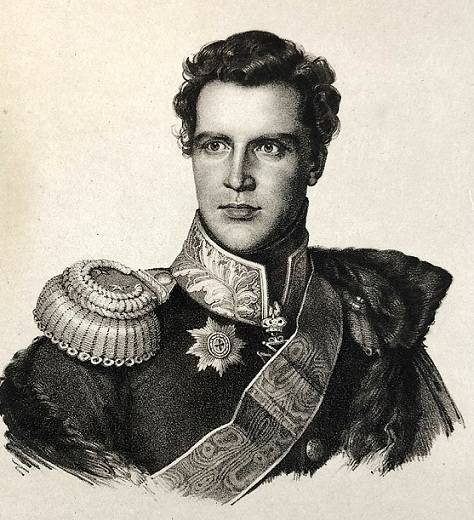
The commander of the Separate Caucasian Corps, General Yevgeny Aleksandrovich Golovin, ordered the unexpected allies to be left with the troops, about which he immediately notified the capital. How successfully the Tabasarans' forces were used in the 1838 year is unequivocally difficult to answer. However, already in the 1839 year, General Fezi, led by 11 with half the battalions and a detachment of mountain militia of a thousand people defeated the rebel mountaineers of the Samur Valley in the battle of Ajihur. In addition, the presence of mountain police in the Fezi corps brought discord into the ranks of the Samur rebels and changed the view of the local population on the entire uprising.
These facts were not ignored by the capital, even encouraged. So, only in Dagestan in the first half of the 19 century many police detachments were formed: Avar, Akushinsk, Dagestan, Jaro-Belokan, Kazikumyk, Karabulak, Mehtulinsk, Samur, Syurga, Shamkhal, etc. All these formations were generously rewarded not only financially. Particularly distinguished mountain police officers were awarded one or another award. And the units that successfully proved themselves in battle were solemnly awarded combat banners with inscribed inscriptions. For example, such an honor was given to the Kazikumyk (Kazikumukh) foot police. This unit received a red banner with the inscription: "Kazikumyk pedestrian militia for the difference in the battles at Kulul-Rugdzh and Tilitlin heights." On the back, the same inscription was duplicated in Arabic.
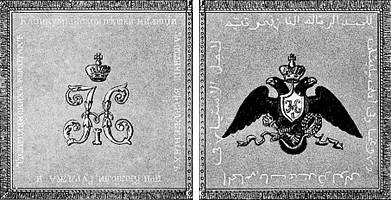
To the credit of the mountain militia, it is worth noting the upholding of the Shusha fortress (Nagorno-Karabakh), besieged by the Persians in the 1826 year.
The Russian commandant of the fortress, who was worthy of a siege, later recalled the Armenian police fighting on the side of Russia:
To be continued ...
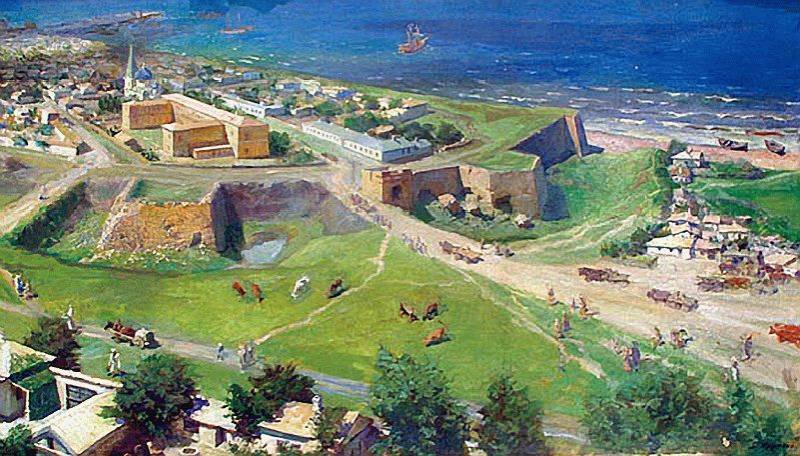
Information